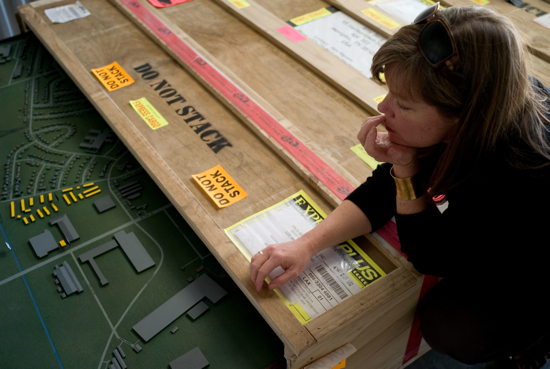In 1989, a year after Errol Morris’s documentary The Thin Blue Line opened in the USA, its protagonist Randall Dale Adams – whose innocence Morris ‘proved’ through dramatic reconstructions – was released from death row. Pioneering techniques that the director would later become famous for, most notably the Interrotron, The Thin Blue Line built a testimony of Adams’ innocence through multiple viewpoints, constructing a powerful case which cast the thin blue line that supposedly separates us from anarchy as a blurry one, between conflicting ideas of truth and knowledge, self-deception and corruption. Through dramatisation, Morris created an eerie world, scored by Philip Glass, of alternative possibility.
The film was in this sense an unofficial retrial with the cinema audience as jury. It was a correction to the corrupt cops and bent officials who desperately wanted to sentence a man to death for the murder of a Dallas police officer in 1976. At the time, however, the evidence inconveniently pointed to a 16-year-old, who was too young to be eligible to be killed by the state of Texas.
Comparisons to Amy Berg’s new film are unavoidable, because West of Memphis is a film-trial too. Now though, we have a new language to talk about it – and the doc calls itself "the first crowd-sourced criminal investigation". West of Memphis therefore poses an interesting question, a continuation of the moral questions that The Thin Blue Line asked, as to the role that cinema can play as an unofficial form of judiciary which can hand down its own sentences. This is an exhaustive documentary that redresses the case of the West Memphis Three – Damien Echols, Jason Baldwin and Jessie Misskelley, Jr – who were imprisoned for the supposed ritual killing of three young boys in an Arkansas swamp. The ‘strangeness’ of the killing – that the children’s bodies were hogtied and seemingly mutilated and tortured – was aligned by the prosecution with the teenagers’ interest in the occult, and in wizards and heavy metal, as proof of their innate evil beliefs. This was in 1994, when America’s South was in the grip of ‘Satanic panic’.
Berg compiles an meticulous haul of evidence through case files, depositions, ’90s video footage of the original trial and extensive interviews with all those involved, and finds a new suspect in Terry Hobbs, the stepfather of one of the murdered boys. The first section of the 150-minute running time sets up the case as it was presented in 1994; the middle part untangles the misrepresentations and mistakes that were made; and the conclusion finds its focus on Hobbs, the last person to be seen with the boys, who was known to be abusive and whose nephew says the killing is the "Hobbs family secret". Structurally, West of Memphis makes it nearly impossible to come to any other conclusion than the one it offers, and although this is no more manipulative than a court trial structure, something about its position as a stand-in for the law feels uncomfortable. Berg argues that this is a necessary position for her to take, as the law has failed us, and documentary film must step in, instead.
West of Memphis unfolds as a kind of ‘hex, lies and videotape’ story, with the incredible wealth of grainy VHS footage used reconstructing a moment in America’s recent history where outsider beliefs and subcultures were viewed with intense suspicion. It is a compelling documentary – well-researched, well-edited and interesting for the position it takes towards the law – and while Echols and co are no doubt innocent, it reflects the incredible power of film to recreate reality and dole out its own justice, something that should perhaps be viewed with caution.
At what point did you become sure, personally, that Damien was innocent?
Amy Berg: Before I signed on to do the film. I did my due diligence; I spent months going through the case and speaking to lawyers. For me, it was clear that Damien had an alibi and the overwhelming opinion of all these top forensic experts in the country that the wounds on the victims were post-mortem, meant a lot to me. Obviously, that is the centrepiece of the film – it is the most dramatic moment. When you take your emotions out of it, and you see the marks all over their bodies, and you think about it logically, there would have had to be some depth to the wounds if they had been stabbed; there would have been organ damage. But none of that existed. So, when all of these experts looked at the original reports (all of it was there in the original trial, none of this was new information, it was just misinterpreted) there was clearly a problem with the first trial. The evidence was mis-presented. lt told me clearly that we had to start from scratch. It became clear that the three boys were hit over the head with a blunt object. One child had a black eye and a fat lip- that was Stevie Branch – the last person seen with the kids was Terry Hobbs. It just seemed very obvious that this wasn’t what was presented in the first trial.
In that sense, the film becomes the law. It fills the gap where, in your opinion, the law has failed. What are the ethical problems of using cinema as a kind of justice?
AB: Well, the film is the trial. I think that the system doesn’t work. Look at the presidential race. $1.5 billion is what it takes to run a presidential campaign, and you think about the taxpayers, and the people who actually need the government, and you think- where is the shortfall going to hit? I know that’s an extreme example, but voices outside of the system have to be heard, and I think documentary film is a very powerful medium for such voices. I’m surprised that the state of Arkansas isn’t taking more interest in doing justice, because I really thought that this was the oath that these men were taking when they signed on to be judges and prosecutors – to find justice, and it’s clear that they had no interest in justice. It’s clear that they wanted to palm the town down. I think you guys are experiencing this too, with the Hillsborough case, and it’s like, What?. How did everyone move forward for 20 years, how do we go forward carrying such a misnomer around? There is no way to have order in society if you base it on a lie, and that’s what Satanic panic was, a useful lie.
In your first film [2006’s Deliver Us From Evil] you take on the Catholic Church. This time, the US legal system. What is it about these stories that interest you?
AB: I think it’s something that is the most insulting to me, as a person, when a system is abusing its position. I think it is completely wrong. So in that sense I like complicated stories that I can simplify to make accessible to a wider audience. Both the films I’ve made speak to people on an outrageous level. The stories have moved me for these reasons.

There is a strongly patriarchal element to both systems that you explore. Did you feel endangered or intimidated, but more specifically because you were a woman?
AB: You are actually the first person who has ever mentioned that! But it is really true: a lot of the men I encountered in making both films really thought they could manipulate me because I’m female. It is insulting. They just assume that you are not in your proper place.
Damien Echols, one of the accused who in the end walks free, is credited as a producer. What do you feel the moral implications of this are?
AB: Morally, I think it’s amazing that he’s able to claim his story. Who am I to claim his life story? It was a huge act of trust for him to work with me, and for us to include him in that way. It’s the only way to do it. Why should his story be given to anybody, unless he can sign off on it? It is such a personal thing, to allow someone to make a documentary about you. He felt like for the first time, he had a say. That is a powerful thing.
West of Memphis goes on nationwide theatrical release from Friday December 21.



